Number 42
In this issue:
- France’s Thatcher sparks social war
- Thought ( ) spies
- Okinawa: resisting the US occupation
- How to kill a book
- Anarchist values
- Acorninfo
1. France’s Thatcher sparks social war

It has long been obvious that the Thatcher years in the UK were an important moment in social history, which paved the way for the neoliberalism we know today.
Her fervently pro-US government pushed through wave after wave of privatisation and assaults on the public sector, dismantling the structures of the vaguely social-democratic version of industrial capitalism that had remained intact since the Labour election victory of 1945.
The same thing is happening in France at the moment under President Emmanuel Macron, a hardline neoliberal in the Thatcher mould, who hides this by adopting, in a Tony Blair kind of way, a smoothly “progressive” facade.
Like Thatcher and Blair, Macron is “pro”-US in the same way that leaders of Cold War East Germany could be said to have been “pro”-USSR.
With Brexit, the US neoliberal empire lost its key placeman in Europe, so it was vital that France flew the flag for “Transatlantic values”.

Macron, a former investment banker at Rothschild, was actually groomed by a US propaganda organisation, the German Marshall Fund of the United States, as they proudly declare on their website.
He was “awarded the Marshall Memorial Fellowship, the flagship leadership development program of the German Marshall Fund of the United States, in 2006”.
Macron “participated in an intensive learning and networking experience designed to foster collaboration, build personal capacity and prompt innovative thinking and problem-solving” and was “immersed in communities across the Atlantic through travel and study”.
Macron may have won the 2017 election, but his attempts to Thatcherise France are proving deeply unpopular and have sparked massive opposition in the streets.

The main elements of this revolt concern:
1. Trade unions. Currently the railway workers are in the front line, fighting Macron’s attack on the SNCF and the unions.
2. Education. His neoliberal education “reforms” are being met with fierce resistance by students and lycéens – High School students – with occupations and protests across the country.
3. Migrants. Macron may have won the presidential run-off because people didn’t want a Front National government, but his interior minister Gérard Collomb is rolling out anti-immigrant rhetoric and legislation worthy of the extreme right.

4. Zadistes. Macron abandoned plans for an airport at Notre-Dame-des-Landes only to launch a brutal eviction of the zad, a unique free space of resistance and alternative living.
5. Police violence. Common to all these aspects has been a spiralling use of thuggish violence to impose neoliberal policy. Trade unionists, students and other protesters have been frequently attacked by the CRS riot police. Far-right vigilantes appear to be working hand in hand with the state. At the zad, a young man had his hand blown off by a police grenade and dozens have been beaten up and injured by Macron’s enforcers.
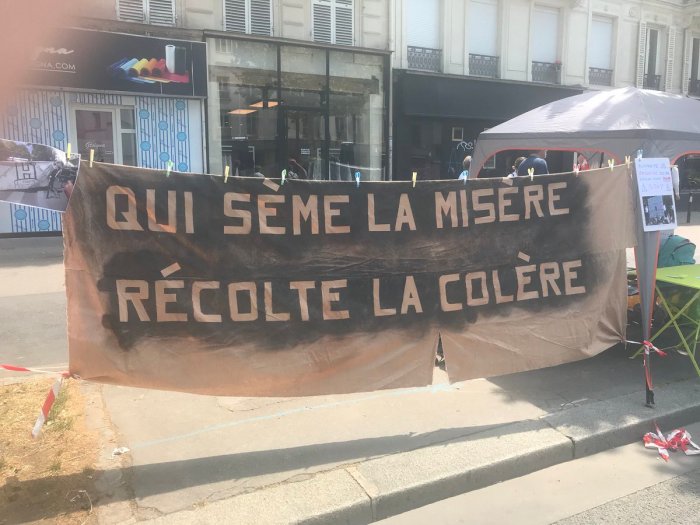
6. “Convergence des luttes”. The positive side to all this is that there has been increasing emphasis on a convergence of all the struggles, a realisation that they in fact amount to one single social war. Rail workers have supported the zadistes and vice-versa. There is solidarity between students, anti-fascists, anarchists, socialists and so on. The common enemy, the Macron regime, and its extreme neoliberal objectives, are plain to see.
Defeating this enemy will not be easy, despite the enthusiasm generated by the 50th anniversary of the May 1968 uprisings, but if Macron had wanted to radicalise a whole new generation of young people and turn them into sworn enemies of his neoliberal project, he could hardly have gone about it better.

Most of us are familiar with word puzzles that invite us to fill in the missing link between two apparently unconnected words. The solution to road ( ) bean would be “runner”, the answer to salad ( ) gown would be “dressing”, etc.
The same game can be played with issues and events. Two different things are going on at the same time, which seem to be unrelated. But, if you pay attention, you will see that there is a hidden element which ties them together.
To see how this works, let’s take two current UK controversies. The first is the Philip Cross scandal, in which Wikipedia entries have been systematically edited for political ends by some kind of self-appointed thought police.
The second is the question of police infiltration of dissident political movements. After activists started unmasking police spies in 2010, with media interest, the state was forced to hold an Undercover Policing Inquiry, which has led to more revelations and a lot more official obfuscation and cover-up.
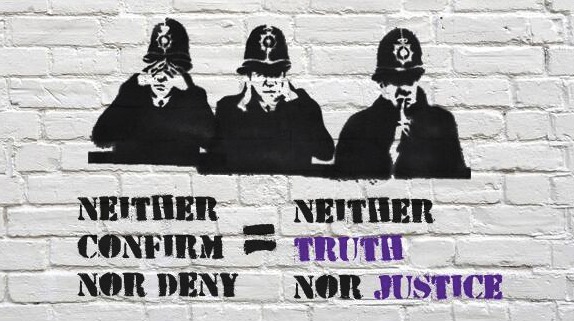
The puzzle here could be expressed as thought ( ) spies and our sharper readers will already have spotted that the answer is “police”.
But what implications lurk behind the word, in the context of a bracketed zone between Orwellian re-writers of the record and coppers pretending to be activists?
As a useful article by Connor Woodman in Jacobin Mag reminds us, there is a political objective behind the spy cop operations: “These overwhelmingly left-wing groups were infiltrated for a clear reason: to delimit the scope of threats to the status quo”.
In our own recent Winter Oak special report we looked at the way in which the infiltration of our movements is not limited to the level of practical activism.

It is clear that we are witnessing a concerted attempt at ideological sabotage, at a bid to destroy anarchist and anti-capitalist coherency and effectiveness by infiltrating and undermining its thinking.
Much of this currently seems to revolve around the “red-brown” smear, the claim that certain people on the left are actually, wittingly or not, pandering to fascism and crossing a line of “acceptable” opinion.
This is staged in a very clever, but intellectually dishonest, way.
The witch-hunt process paints itself as coming from a very enlightened anti-fascist position.
And from that position, which amounts to the moral high ground in anti-capitalist circles, it condemns others as being somehow right-wing, reactionary or, increasingly, “anti-semitic”.
But the truth is the exact opposite. The witch-hunters are themselves part of a pro-war, pro-US, pro-Israel, neoliberal network and are attacking their targets not from the left but from the right.
They in fact object to anyone who is critical of the neoliberal system and its imperial wars.
The whole “red-brown” angle totally reflects the neoliberal worldview, in which they, the imperial capitalists, are the political default position, the “centre”, and anyone who opposes them is an extremist, a populist, a “red-brown” fascist.
By constantly insisting that the anti-capitalist left is somehow close to far-right populism, these neoliberals are in fact doing the very work they accuse others of doing – of trying to blur the lines between the two very different and in fact incompatible world views.

This attempted ideological amalgamation is an assault on the left, a bid to tarnish its strong ethical principles with racist or other unsavoury associations.
Apart from the neoliberals themselves, the other big winners from this strategy are the fascists, who suddenly find the perfect camouflage for their views. When half of the left are being accused of anti-semitic or fascistic tendencies, what have real fascists got to fear?
Do the fake-left witch-hunters care about this? No, because they are not actually anti-fascist. They merely use the “fascist” smear as a way of discrediting and disabling the anti-capitalist left in the interests of right-wing neoliberalism.
These attacks are being churned out at an alarming rate at the moment, and all seem to follow more or less the same line of attack.
Witness a three-part article which appeared on the New Zealand site Fightback entitled “The Red-Brown ‘zombie plague’: how fascist ideas are becoming popular on the Left”.

Author Daphne Lawless, a supposed left-winger, launches straight in with a complaint about left-wing challenges to the dominant narrative in Syria. Like all neoliberals, she just has to leap to the defence of Uncle Sam.
Claims of pro-US false flag attacks are “baseless slander” and, of course, nothing but “conspiracy theories”, tainted by association with the far right, she says.
This is her springboard into the usual smears. It is all part of “a growing convergence of Leftist and far–right rhetoric”, a “red-brown” menace.
Critics of US imperialism, she suggests, neatly integrating the US state’s “fake news” offensive, have simply fallen for “Russian propaganda”.
Lawless approvingly quotes an attack on anti-Americanism by Moishe Postone, the Canadian “leftist” who is regarded as a major inspiration for the antideutsch movement, that bizarre pro-US, pro-Israel, pseudo-leftist German political movement.
On and on she goes, leaving the reader with a gnawing realisation of how familiar it all seems. The obsession with Syria, Russia and “the Iranian mullahs”. Her quoting of the views of Alexander Reid Ross, Jonathan Freedland, Robin Yassin-Kassab and Leil al-Shami to back up her arguments. Her dislike of Jeremy Corbyn, Noam Chomsky, Vanessa Beeley, Jill Stein, Max Blumenthal, Caitlin Johnstone, Roger Waters…

Lawless in fact generally shares the same likes and dislikes as whoever is behind the Wikipedia re-writing.
The “bad guys” are anyone who criticises the US empire and the “good guys” are all the cloned corporate hacks who furiously condemn them as “red-brown” pro-Russian fascists for daring to do so.
But there is more to the neoliberal attack on the real, anti-capitalist, left, than this spurious equation of anti-imperialism with nationalist or pro-Russian positions.
The other big ideological weapon in their armoury is the claim of anti-semitism and this is being rolled out with desperate regularity.
This has now gone far beyond questions around Israel or Zionism and is being used to vilify all direct opposition to the capitalist system.
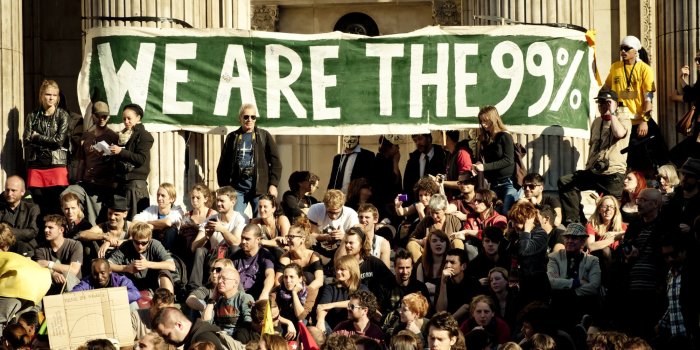
Author and blogger Jonathan Cook remarks: “It is an indication of how quickly this slippage is occurring that repeating now a slogan of the Occupy Movement from only seven years ago – that we are ruled by a ‘global elite’, or the ‘1 per cent’ – is cited as proof of anti-semitism. The liberal New Statesman recently ran an article dedicated to proving that the articulation of basic socialist principles – including ideas of class war and the 1 per cent – was evidence of anti-semitism.”
He concludes that the mystification of anti-semitism is being used to prevent any criticism of “a turbo-charged neoliberal capitalism destroying our planet”.
A look at the article in question shows that he is right. Targeting Corbyn in particular – a real hate figure among neoliberals, presumably because he might win a UK general election – authors Matt Bolton and Frederick Harry Pitts condemn “his understanding of capitalism as a ‘a rigged system'” and declare that “if Corbyn is as serious as he says he is about militant opposition to anti-semitism, his worldview as it is may not survive intact. Rather, it must be radically revised and rethought”.
And whose words do they use to back up this insidious argument? None other than Daphne Lawless’s hero, the late Moishe Postone. The same old script!
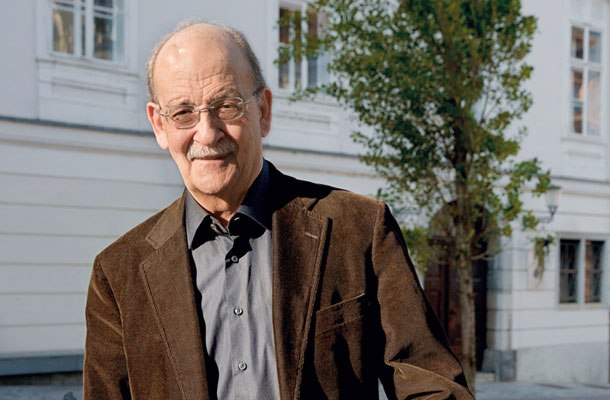
The message of these various efforts is that if you don’t want to be called an anti-semite and a red-brown fascist, in “left-wing” articles and on Wikipedia, you will have to “radically revise” your anti-capitalism so that it suits the neoliberal fake-left agenda.
You will have to say that capitalism is not a rigged system, that a tiny elite ruling class does not hold all the wealth and power, that Israel is not a militaristic apartheid state, that the USA is not a warmongering imperial capitalist menace to the rest of the world.
You will have to say that two plus two makes five, otherwise the neoliberal thought police, posing as holier-than-thou fellow left-wingers, will be out to get you…
3. Okinawa: resisting the US occupation
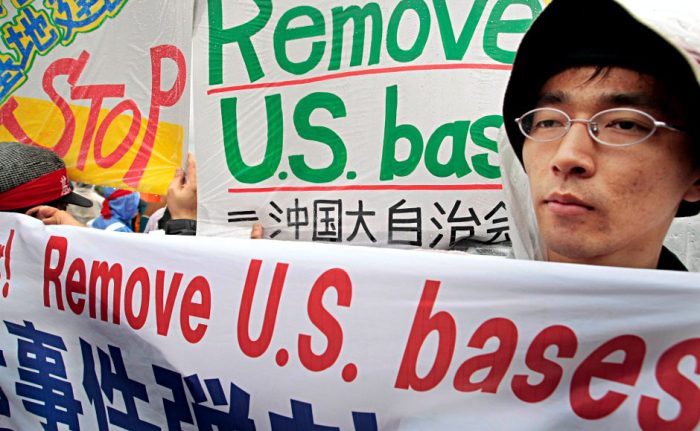
A startling insight into the ongoing US military occupation of the Japanese island of Okinawa has been published on the In The Fray website.
The article was written by Eliza Egret and Tom Anderson of Shoal Collective, a newly formed cooperative of writers and researchers writing for social justice and a world beyond capitalism.
More than six decades after America’s post-World War II occupation of Japan officially ended, more than 50,000 US troops remain there. Over half of them are stationed on Okinawa, an island with a population of 1.3 million, which the United States values as a strategic base close to China and North Korea.
Although few people outside of Japan know about it, demonstrations go on daily against the thirty-two US military bases and forty-eight training sites on Okinawa, which occupy about a fifth of the island’s land. The protests have been a feature of Okinawan life since the beginning of the US occupation in 1945 (which officially ended for most of the country in 1952, but not for Okinawa until two decades later).
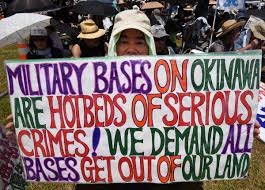
From time to time the discontent has exploded into massive street demonstrations, often in response to violent crimes connected to military personnel, such as the 1995 rape of a twelve-year-old girl by three American soldiers and the 2016 rape and murder of a twenty-year-old woman by a former marine working as a contractor for the US military.
In the late 1990s, the US military and Japanese government announced plans to build a new helipad in the far north of Okinawa and relocate the aging Futenma air base to the Henoko district of Nago, a city near the island’s centre.
For a time, fierce public opposition stymied those plans, but after the conservative government of Japanese prime minister Shinzo Abe took power in 2012, the work moved ahead. The plans for Henoko involve the expansion of the Marine Corps base already there, Camp Schwab, and the construction of a military runway in the waters of Oura Bay, which critics say will destroy coral reef and seagrass essential to the survival of aquatic life like dugongs, a manatee-like species of marine mammal.
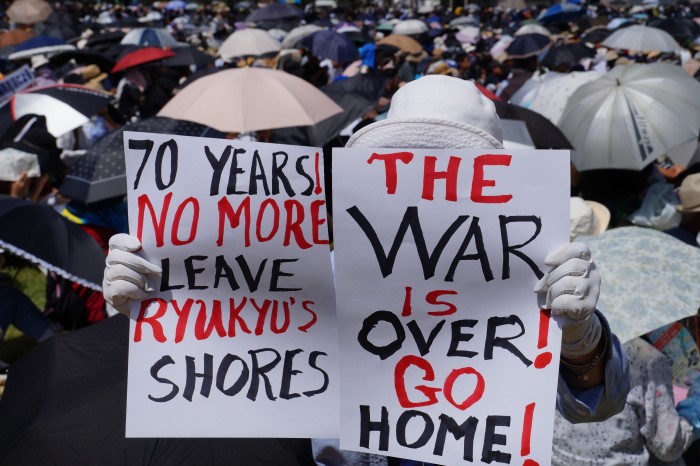
Japan has remained militarily dependent on the United States ever since the postwar occupation, when it was forced to accept a new constitution banning it from building offensive forces, and its government has long supported the establishment of US military bases throughout the region.
Hiroshi Inaba, a sixty-seven-year-old Japanese peace activist, received an eight-month suspended prison sentence last year because of his work protesting the US military presence on Okinawa.
He told the Shoal journalists: “After the war, the US government thought that Okinawa could be a keystone in their policy against China. US occupation on the island lasted for twenty-seven years, and people used the dollar note. Okinawa wasn’t returned to Japan until 1972.
“More than 70 percent of US bases in Japan are in Okinawa. Okinawan people don’t want the US base construction, but they’re not being listened to. People here deserve democracy and human rights.
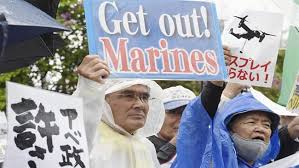
“Some people protest because they’re upset about nature being destroyed—others because of the noise pollution at night from the Osprey military helicopter flights, or because of the lack of democracy, or because [their] relatives were raped by US soldiers.
“Tell people what’s happening in Okinawa—that’s the thing I want people to do the most. A lot of people here can’t speak English, so they can’t tell the outside world what’s going on.”

How would the CIA go about making sure nobody in the English-speaking world could read a book which revealed some uncomfortable truths about its operations?
“It’s an old lesson that blacklisting and publicly banning books is counter-productive, and often leads to stronger sales long-term,” comments someone investigating this very issue.
A much better approach, they suggest, is to quietly “capture and kill” the offending volume. “This method requires a fake publisher, who acquires the rights and then simply refuses to sell the book.”
This seems to have been what has happened to a German best-seller by Udo Ulfkotte, the former editor of the well-known Frankfurter Allgemeine Zeitung.
His book Gekaufte Journalisten (Bought Journalists) drew on his own experiences in corporate media to explain how its editors are totally under the control of the neoliberal system. Those who do not play along either cannot get jobs at any news organization, or find their careers cut short.

Ulfkotte admitted himself collaborating with this US-led manipulation of “news” by planting stories in the media for the CIA.
He talked in English about his experiences of being wooed by powerful “Translatlantic organisations”, and his decision to go public, in this TV interview.
https://www.youtube.com/watch?v=sGqi-k213eE
The book was a big hit in Germany and an English version, called Journalists for Hire: How the CIA Buys the News, was supposedly published in May 2017 by US-Canadian publisher Tayen Lane.
But it has never become available and Tayen Lane have not been forthcoming with information.

German publishers Kopp Verlag apparently told one enquirer: “Unfortunately, after signing the contract we have not heard from Tayen Lane, our letters and emails have gone unanswered.”
An American resident who became interested in the case recently searched out Tayen Lane’s offices and reported: “It was no surprise their office doesn’t actually exist. There’s no trace of Tayen Lane anywhere at the address they give.
“Conclusion: A fake publisher has quietly ‘captured and killed’ a German best-seller. How many other books are disappeared in a similar way? No one knows, except the ones doing the censoring.”
Udo Ulfkotte died from a heart attack on 13 January 2017 at the age of 56, while awaiting US publication of his book.
May 31, 2018. After we published the above article (last night) it was kindly brought to our attention that Udo Ulfkotte became notorious in his later years for his derisive comments about immigrants in Germany. We still think that the story of his book is worth telling, but we want to make it clear that we in no way support his anti-immigrant views and are not presenting him as any kind of political hero!
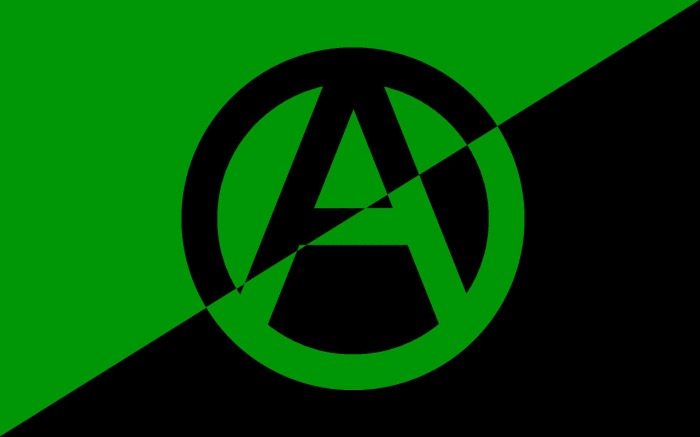
Five years after Winter Oak published his first book, The Anarchist Revelation, Paul Cudenec has set out the basic elements of the personal version of eco-anarchist philosophy he is developing in the face of a “hostile intellectual environment”.
He writes: “I regard industrialism as a facet of capitalism and therefore something that is necessarily anathema to anarchists. I wouldn’t term myself a ‘primitivist’, but I certainly hope for an end to the nightmare of industrial society and for a future where people can live in harmony with the natural world, growing and producing according to the needs of the community rather than for the profits of an exploitative few.
“I advocate a future society based not on money, economic ‘growth’ and technological ‘progress’, but on values. These values would be anarchist, of course – co-operation, equality and non-domination – but also, more broadly, involve the respect and appreciation of nature, beauty, quality, authenticity, simplicity, honesty, integrity and dignity.
“I am seeking to piece together a philosophy founded on nature and on our belonging to nature. This seems to frighten some urban-minded anarchists, but was in fact very much what Kropotkin was working on, particularly in Ethics.

“By a philosophy of nature, I don’t just mean environmentalist politics, but an understanding of the human mind, and the human culture it has created, founded on the fact that we are one small part of a greater organic whole, usually called ‘nature’. Our innermost mental structures and tendencies reflect that belonging: it is the canvas on which our human culture is painted.”
He explains he is consciously pursuing a holistic approach, focusing on “interconnections and correspondences” and the idea that we belong to a dynamic and living universe: “This is anarchist metaphysics! What could be more empowering, philosophically or politically, than realising that you are a temporary manifestation of a great organic whole, with all the freedom and responsibility this involves?”
The whole article can be read here or here.
A radical political space was briefly opened in central London on Sunday May 27. Kurdistan Place was occupied by friends of Anna Campbell in solidarity with the Kurdish Freedom Movement. In a statement, the occupiers said: “We want this space to enable learning about Kurdish culture and Kurdish liberation’s emancipatory politics. We also want this space to enable solidarity and anti-capitalist organising.” The first meeting there was held by the Anarchist Action Network and there were workshops on Kurdish language and dance plus a talk on anti-fascism before it was announced by @KurdistanPlace on Twitter that the occupation was ending on May 31.
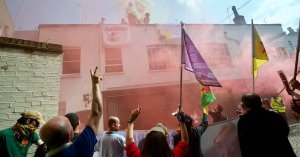
* * *
European police launched a new wave of repression against anti-capitalists on May 29, raiding addresses in Italy, Spain, France and Switzerland in connection with last year’s protests against the G20 in Hamburg, Germany. German public broadcaster NDR reported that apartments in Rome, Genoa, and Madrid were among those searched, including properties “linked to the left-wing scene”. The “Black Bloc” task force in Germany has been combing through police footage, CCTV recordings and private videos with the help of facial recognition software and geolocation data to track down dissidents.
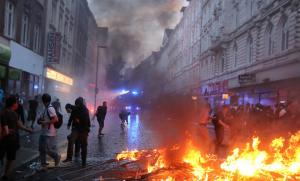
* * *
Protests against the 2018 G7 summit are due to get underway in Quebec City on June 8. Says the antiG7 site: “For the beginning of the G7 Summit, the elites of the world will gather in La Malbaie, isolated in their ivory tower protected by more than half a billion in security costs. They might as well stay there! Everyone in the world will be better off without them and that is why we intend to cut ties with the people creating our misery. Come join us! Meet us at 7:30AM SHARP in the parking lot of the Normandin on the corner of the François-De Laval and Sainte-Anne boulevards, in the Beauport borough, 5km northeast of downtown Quebec City.”

* * *
A celebration of 50 years of resistance, campaigning and alternatives for a better world, despite 50 years of police opposition, spying and repression, is being staged in London in July. It will include a rally in Grosvenor Square at 1pm on Saturday July 7 and a conference and exhibition at Conway Hall, Red Lion Square, on Sunday July 8.
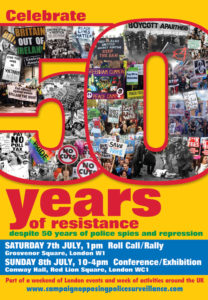
* * *
Ineos’s fracking protest injunction will be challenged at appeal court, after campaigners won their latest legal battle. Joe Corre (left) and Joe Boyd have described the move to stop protests as “unprecedented” and “draconian”. The injunction criminalises trespass and what is described as “unlawful and unreasonable obstruction of the highway”, including slow walking, climbing on vehicles and lock-on protests. Breaching the order risks prison, fines or seizure of assets. With Cuadrilla about to try the same approach, and the government threatening to remove decision-making on fracking from local authorities, the fracking mafia are clearly worried that the resistance is winning…
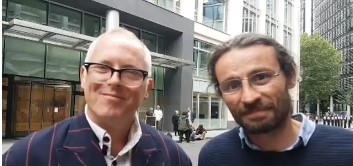
* * *
A discussion on Radical Ecology is being staged by the UK’s Anarchist Federation in east London on Saturday June 9, as part of its AntiUniversity programme. It is taking place from 4pm to 6pm at Doomed Gallery, 65-67 Ridley Road, Dalston, E8 2NP.

* * *
An analysis of the rise and future of the degrowth movement has been published by The Ecologist. Federico Demaria summarises the way that the French activist term décroissance entered the English-speaking world as ‘degrowth’ and the way it has been developing over the last decade, through various networks. He adds: “The alliances among these networks, and networks of networks, are fundamental to weave the alternatives and foster a deeply radical socio-ecological transformation. We could imagine it as a rhizome of resistance and regeneration.”

* * *
Acorn quote: “Men once believed that the establishment of universal suffrage would guarantee the freedom of the people. That, alas, was a great illusion…”
Mikael Bakunin

(For many more like this, see the Winter Oak quotes for the day blog)
—–
If you like this bulletin please tell others about it. Subscribe by clicking the “follow” button.
—–
Back Issues
Follow Winter Oak on Twitter at @WinterOakPress

Reblogged this on Anarchy by the Sea!.
LikeLike
Reblogged this on Wessex Solidarity and commented:
We have to remind ourselves that ‘left and right wing’ refer to relative positions in a representative assembly, something we would have no truck with.
The overwhelming majority of self-identified left wingers postulate a functional monopoly on coercive force, and would be unable to put their beliefs into practice without strong-arm gangs, lock-ups, professional killers and a spy network.
LikeLike